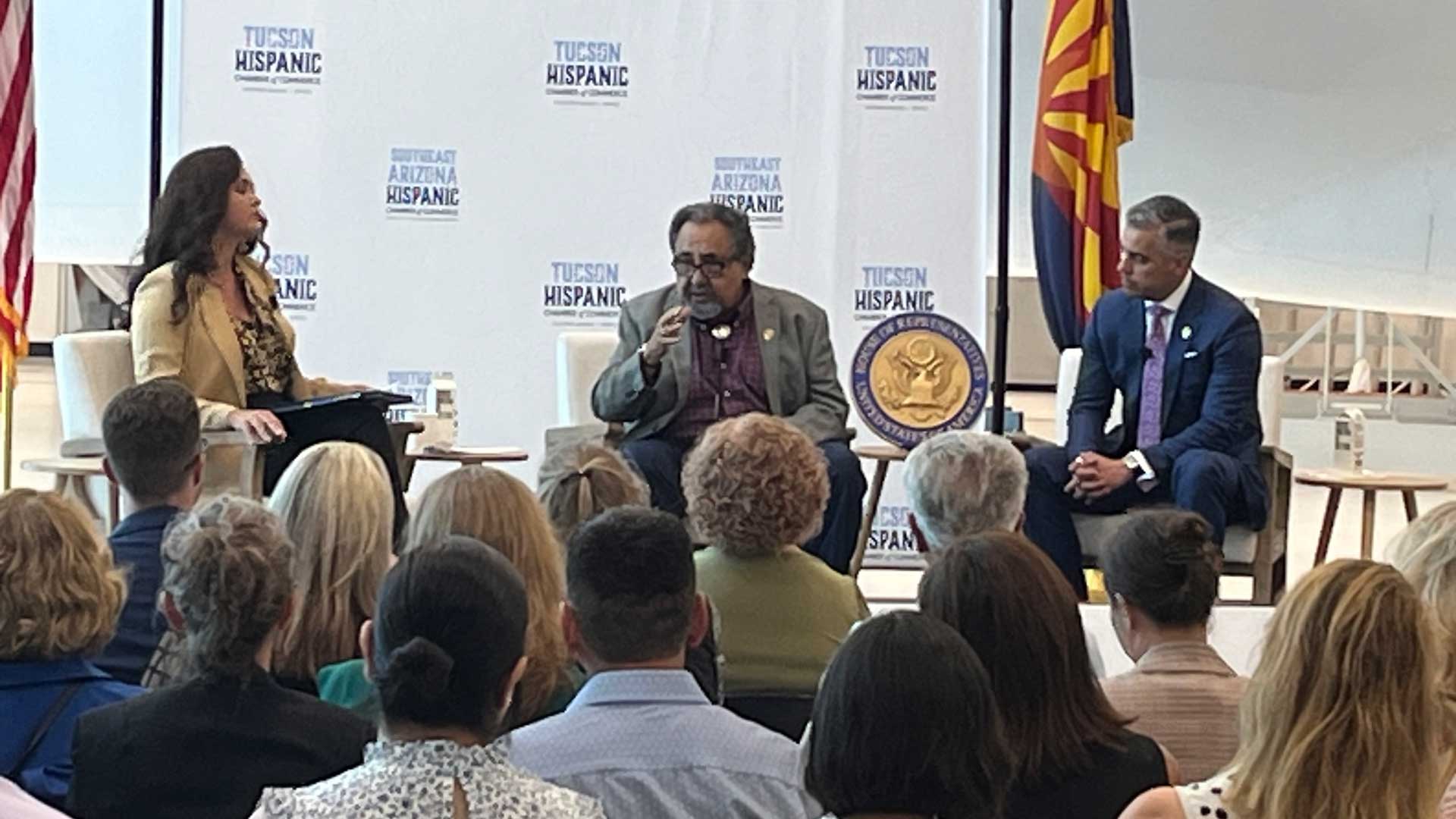 Congressman Raul Grijalva (D) and Congressman Juan Ciscomani (R) talk with the Tucson Hispanic Chamber of Commerce. August 23, 2023
Congressman Raul Grijalva (D) and Congressman Juan Ciscomani (R) talk with the Tucson Hispanic Chamber of Commerce. August 23, 2023
Republican Congressmen Juan Ciscomani and Democrat Raul Grijalva held a rare bipartisan conversation on Tuesday, Aug. 22.
It is increasingly rare for two congressional representatives on opposing sides to appear on the same stage, especially in an event that is not an official debate. The conversation was hosted by the Tucson Hispanic Chamber of Commerce.
Federal spending and border policy dominated the conversation at Pima Community College.
Both men expressed strong opposing stances on immigration. As both of the representatives’ districts cover the entire Arizona border with Mexico, immigration is an important issue to both them and their constituents.
Grijalva is a supporter of comprehensive immigration reform.
“I'm a comprehensive immigration reform person. And I think that that's the way to solve this crisis. And it is a crisis,” he said.
As an immigrant himself, Rep. Ciscomani said immigration is a deeply personal issue to him.
He told the audience that he sees immigration policy as falling into three separate buckets; the actual immigration process, security, and trade. To Ciscomani, border policy should deal separately in these three areas instead of sweeping reform.
Grijalva also called out his Republican colleagues Andy Biggs and Paul Gosar for injecting race into border conversations.
“As I pointed out, Mr. Gosar and Mr. Biggs, the comments that they make are insulting. Sometimes, if not racist, right on the border. I’m not going to stop calling them out on that kind of stuff. That’s not part of the dialogue,” Grijalva said. “With that point of view and to continue to interject that into the discussion, then there is no opportunity to find the middle ground.”
“Given the environment today, trying to do this in a long comprehensive way poses serious challenges that I don’t see moving forward. What we need to do is take separate bites of the apple that deal with issues that we can fix now,” Ciscomani said.
When representatives return to Washington D.C. next week, their first priority will be to pass a budget before the end of the fiscal year on Sept 30. As the deadline looms, each representative said they still have deal breakers they’ll stand firm on.
Both men agreed that a budget must pass and a government shutdown cannot happen. However, they also said there are certain deal breakers they will stand on when it comes to passing a budget.
One of Ciscomani’s is excessive government spending.
“No new taxes, no new government programs, we can get to where we need to get to while being very responsible and funding the top priorities as well,” Ciscomani said.
Grijalva attacked what he sees as Republicans “poison pills,” or culture issues injected into legislation proposals. He says these prevent important legislation from passing.
“Let's take out those poison pills. Restricting a woman's rights, reproductive or otherwise, limiting and marginalizing groups of people because of who they love. Taking these cultural grievances and making them part of a budget process where the investment is what's at stake,” he said.
Grijalva, a senior congressman, said that if it came down to a choice between his conscience and passing a budget, he would have to choose his conscience.
“Whether you're a freshman or a senior member like myself, the only thing you have to take away with you is your conscience and the values that you stood for,” he said.
Both men agreed on the necessity of passing a budget. As a Congressional veteran, Grijalva said that a budget deal can be reached in time to avoid a government shutdown.
Although Ciscomani is a freshman congressman, he holds a seat on the House Appropriations Committee. Despite demands from the far-right Freedom Caucus, he said he is confident that a workable budget can be reached.

By submitting your comments, you hereby give AZPM the right to post your comments and potentially use them in any other form of media operated by this institution.